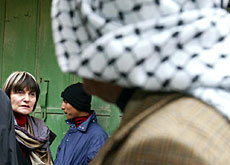
Observer mission surveys tensions in Hebron

The Swiss-supported Temporary International Presence in Hebron (TIPH) mediates between Israelis and Palestinians in the divided West Bank town.
swissinfo accompanied Foreign Minister Micheline Calmy-Rey as she visited the United Nations observer mission, which is made up of six member nations.
Signs of Israeli occupation are everywhere during the journey through the West Bank – the checkpoints, the settlements, the controversial security barrier currently under construction.
A bus full of journalists is following Calmy-Rey’s convoy from Ramallah to Hebron. Access to the town is through the Qiryat Gate diplomatic checkpoint and passes off smoothly.
Four young Israeli soldiers, their faces red from the cold, watch us from a distance and then give us the signal to go through.
Later Hebron’s Palestinian security services, which are not armed, escort the convoy, their sirens blazing. There are few obstacles on the way and the town seems deserted, with only a small number of inhabitants on the streets.
Divided
Hebron is home to around 700 Jewish settlers, many of whom live in the centre, and 120,000 Palestinians.
A 1997 agreement gives the Palestinians control over 80 per cent of the town. The remaining 20 per cent is held by Israeli troops to protect the Jewish community.
Hebron is also the site of a shrine that is holy for both Muslims and Jews – the burial place of Abraham, Isaac and Jacob.
“Hebron is the only town in the West Bank – apart from Jerusalem – where there are [Israeli] settlements in the centre of town,” said Suzanne Leuenberger, a Swiss working for the TIPH, which was formed as part of the 1997 agreement.
Leuenberger, one of five Swiss working for the TIPH, is conscious of the risks of working in Hebron.
A Swiss, Catherine Berruex, and her Turkish colleague, Tungun Cengiz, were killed in an attack in the town almost three years ago. Calmy-Rey paid tribute to Berruex on her visit to the TIPH on Friday.
Importance
Leuenberger is keen to stress the importance of her work.
“As the depository state of the Geneva Conventions, Switzerland has responsibilities in regions that are in conflict, particularly in the occupied territories,” Leuenberger told swissinfo.
The observer says that the situation in the town has calmed, especially after the election of the Palestinian president, Mahmoud Abbas, last month.
But she explains that the members of the TIPH, whose mandate includes creating a feeling of security among the population of Hebron, are quite often harassed by some of the Israeli settlers who mistrust them.
And criticism sometimes also comes from the Palestinian side, often propelled by a sense of frustration at the situation in the town.
A key part of the TIPH’s work concerns recording violations of human rights and humanitarian law.
The workers record their observations in impartial and neutral reports that are then sent to the Israeli army, the Palestinian forces and the six member countries of the TIPH (Switzerland, Norway, Italy, Denmark, Turkey and Sweden).
Suffering
According to the TIPH, the Palestinian population is suffering the most in Hebron. Israeli settlements are continuing to grow, it says, and Palestinians have been banned from driving through a large part of the town.
Shops have been ordered to close and the economy in this once bustling town is stalling, leading to high unemployment.
Tensions and the throwing of stones and other projectiles are daily occurrences, says Leuenberger. But there are some successes.
“We have managed to stop this type of harassment by settlers of [Palestinian] teenagers who were going to school. We have asked the Israeli army to accompany the pupils,” she said.
Calmy-Rey, who is visiting the Middle East, was able to see the situation for herself when she visited Hebron’s old town.
swissinfo, Jugurtha Aït-Ahmed in Hebron
In 1994, Baruch Goldstein, an Israeli settler, opened fire on a holy site in Hebron, killing more than 50 people.
The United Nations condemned the attack and called for an international presence in the town.
The TIPH was set up under the subsequent 1997 agreement dividing Hebron.
It comprises six members: Switzerland, Norway, Italy, Denmark, Turkey and Sweden.

In compliance with the JTI standards
More: SWI swissinfo.ch certified by the Journalism Trust Initiative





























You can find an overview of ongoing debates with our journalists here . Please join us!
If you want to start a conversation about a topic raised in this article or want to report factual errors, email us at english@swissinfo.ch.